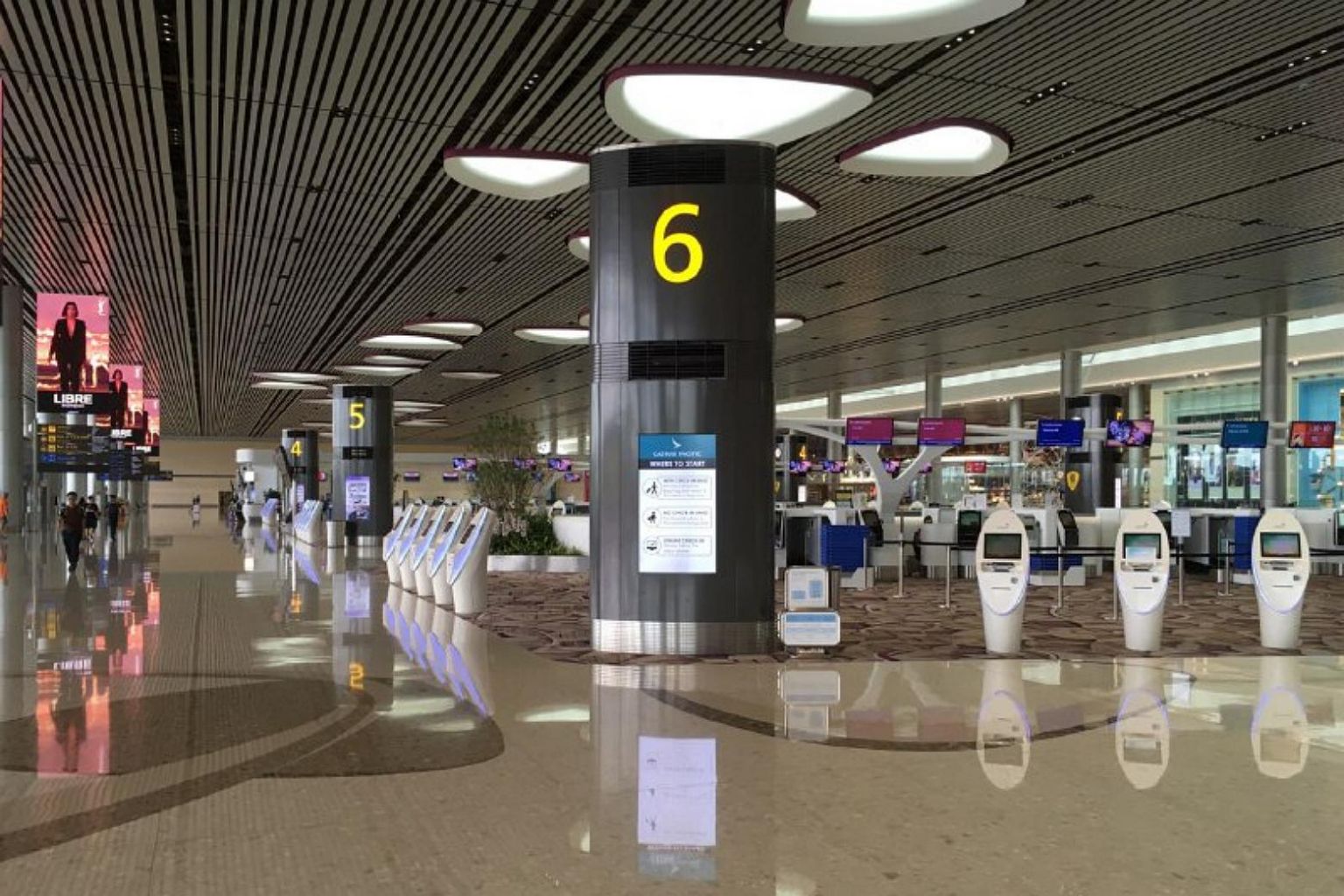Coronavirus: 'Nuclear option' of lockdown highly unlikely in Singapore
Sign up now: Get ST's newsletters delivered to your inbox

An empty departure hall at Changi Airport Terminal 4, on March 20, 2020.
ST PHOTO: ALPHONSUS CHERN
SINGAPORE (THE NEW PAPER) - Experts believe Covid-19 can be defeated without resorting to such an extreme measure with heavy costs.
It was helter-skelter after Malaysia announced a two-week national lockdown on Monday night. The disorder was not just over there but also in Singapore because of the close ties between the two countries.
Students and workers scrambled across the Causeway to beat the lockdown deadline as employers here sought lodgings for their workers.
Like China and Italy, Malaysia has taken drastic action to counter a surge in coronavirus cases, mostly linked to a mass religious event in late February.
When asked if Singapore would consider such a move, which is also in place in France and being considered in London, National Development Minister Lawrence Wong told a press conference on Tuesday that while he could not rule it out, it was not on the cards.
Observers and public health experts say the chaos that ensued after Malaysia's lockdown showed why such a measure would be warranted only if the outbreak gets out of hand and the benefits outweigh the costs.
Dr Gillian Koh, deputy director for research at the Institute of Policy Studies, told The New Paper: "Singapore's survival and sustainability depends on borders being open and receiving goods as well as people.
"So the cost of locking down Singapore is very high, both for the economy and for sustaining daily life itself."
But a recent spike in the number of infections has led to online ire and frustration over people here going on holidays despite advisories to defer non-essential travel.
A record 47 new cases were reported on Wednesday, of which 30 were Singapore residents returning from abroad.
Yesterday, for the first time in five days, the number of new cases dropped, as 32 infections were confirmed, of which 24 were imported, all involving returning Singapore residents.
Arguing why a lockdown was highly unlikely, Dr Koh said: "Even with returning Singaporeans, we have very stringent protocols and all of us do expect them to abide by them... to ensure that we keep the extreme scenario of a lockdown as far away as possible."
National University of Singapore sociologist Tan Ern Ser said it was understandable that Singaporeans felt negatively towards people they deemed socially irresponsible.
Singapore Management University law don Eugene Tan agreed but felt these sentiments would weaken after the outbreak.
Associate Professor Hsu Li Yang, infectious diseases programme leader at Saw Swee Hock School of Public Health at NUS, said a lockdown is a "nuclear option" reserved for when community transmission has to be brought under control quickly.
While this seems to have worked for China, which yesterday saw zero new infections in Hubei province for the first time since the virus emerged there, Prof Hsu said lockdowns cannot be done indefinitely.
With the virus spreading in so many countries, it could also still be re-imported.
Whether an outbreak is severe enough to warrant such an extreme measure depends on how much each society can tolerate its costs, said Prof Hsu.
"Sometimes that price is far higher than what the virus can do," he added.
TESTING CAPACITY
Making a comparison with South Korea's approach, which involved expanding its testing capacity rapidly and implementing strict social distancing, Prof Hsu said each country had to find the right balance and use its strengths where possible to control the outbreak.
"We are fortunate that community transmission is low at present, and there is more leeway in terms of what we can do," he added.
Infectious diseases expert Leong Hoe Nam said it is thanks to the hard work put in earlier during the outbreak that a lockdown is not needed here.
Prof Hsu said what Singapore is doing now is to try to prevent the healthcare system from being overwhelmed at its current capacity, or what is known as flattening the curve.
But at the same time, he said Singapore can also prepare for a possible surge and try to expand healthcare capacity.
He suggested training people to take over some of the work done by nurses so they can be freed up for other tasks.
"For the regular patients... they can just be isolated in a facility where they can't transmit the virus but can be monitored and taken care of in a way that doesn't require the heavy resources of a hospital bed or an isolation room," Prof Hsu said.
Dr Leong was optimistic that Singapore could maintain its efforts in fighting the virus over the next three to six months but warned against complacency.
Reminding the public to stay home if unwell and urging them to defer travel plans, he said: "We have all the necessary ingredients to overcome this outbreak. But all this is hanging precariously. If we are not careful, it can be lost at the drop of a hat."


